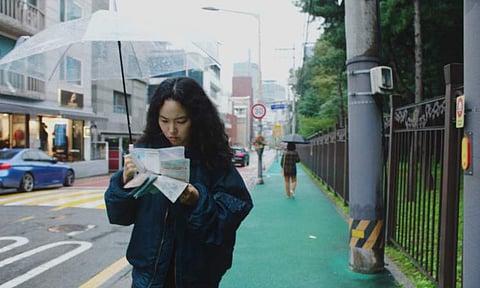

There’s a moment in Davy Chou’s Return to Seoul when the protagonist Freddie, a 25-year-old South Korean girl adopted and raised in France, hears her birth name for the first time. It’s Yeon Hee, which means docile and joyous. A name that is a far cry from her mercurial, impulsive, and stubborn personality. She wants to trace her roots and reconnect with her biological parents. All she has of them is a photograph of herself as a child with a woman, possibly her mother. Return to Seoul takes the audience along on her quest, which also turns out to be about revisiting her own inner self.
Perhaps it’s her origin that makes her footloose, free-spirited, detached, and inscrutable. She is there in a roomful of people and yet not quite. Return to Seoul is a penetrating character study of impetuousness, unpredictability, and an accompanying vulnerability. Then there are the broader concerns that jostle alongside Freddie’s personal soul-searching—the themes of parenting and family, legacies and inheritances, nature and nurture, and home and belonging. Giving her away for adoption might have been for her own greater good but her father hasn’t quite reconciled with the guilt and regrets. There’s an estranged mother from whom she seems to have acquired the chaotic spirit that defines her. Every birthday she wonders if her mother ever thinks of her.
The broader identity issue plays along with the interpersonal drama. Freddie looks like one of their own to her newfound South Korean friends. However, she is very much French. As one sees her hanging out with them in the local café, unaware of the social customs and graces, the essential predicament shines through—to belong and yet be an alien. Her father wants her to come and stay at home with him but it’s she who must remind him that she is French now. Freddie’s very persona is a battleground of identities, constantly getting renegotiated and redefined, getting disjoined and integrating by turn.
Interestingly the hyphenated identity issue goes beyond the screen. The film itself is a co-production of Cambodia, France, Belgium, Germany, South Korea, Romania and Qatar and it speaks in three languages—French, English and Korean. Its maker Chou is a French-Cambodian filmmaker. The film draws from the true story of his friend, Laure Badufle, a French adoptee of South Korean descent. Moreover, the lead actor Park Ji-min had herself moved to France from South Korea at the age of eight. No wonder she steals the show with her unaffected, fresh, and power-packed performance in her acting debut. Giving her company are the very accomplished and extremely popular actors Oh Kwang-rok and Kim Sun-young as her biological father and aunt respectively.
The film begins in the cinema verite style, seemingly unscripted and impromptu. Gradually, the predicaments and perplexity of the situation add layers of drama and lend the narrative a rare density of complex emotions without ever resorting to sentimentality. The soundtrack plays an important role, its jaggedness underscoring the edginess and tumult of Freddie’s life and relationships. There are no resolutions when it comes to her. It’s all about the unsteadiness and volatility of being and belonging with a beautiful melody to hold on to in the end.
Return to Seoul will be coming soon on Mubi.